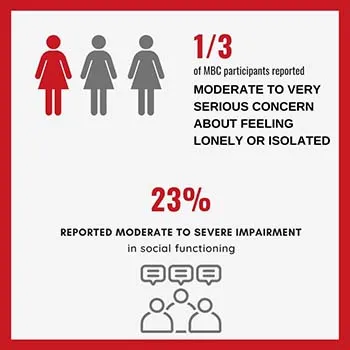Predictors of Social Function and Feelings of Isolation Among Metastatic Breast Cancer Survivors
December 18, 2019

The Research & Training Institute of the Cancer Support Community recently presented findings from itsCancer Experience Registry at the San Antonio Breast Cancer Symposium based on data from 273 metastatic breast cancer patients and survivors. Read on for important takeaways about contributing factors to social functioning and isolation from the point of view of the MBC community, as well as how Cancer Support Community can help!
New Research
- Research from the RTI was featured at the San Antonio Breast Cancer Symposium in San Antonio, Texas in December 2019.
- This research featured data from the Cancer Experience Registry® on 273 metastatic breast cancer patients and survivors who provided chemotherapy history, completed the Patient-Reported Outcomes Measurement Information System (PROMIS-29v2.0) health-related quality of life survey questions, and rated their level of concern about key areas of life.
- The study describes social functioning and isolation and identifies factors related to poorer social functioning and greater concern about feeling isolated among MBC survivors.
Main Takeaways
- Conclusion: Symptom burden, such as peripheral neuropathy and fatigue, is associated with poorer social functioning and increased isolation among MBC survivors.
- Conclusion: Patients currently undergoing chemotherapy have poorer social functioning (even after accounting for the effects of symptom burden).

What does this mean for the patient?
- There is a significant social impact that goes along with living with Metastatic Breast Cancer, and patients benefit from tailored supportive care to address their unmet physical and socioemotional needs.
- Cancer Support Community provides the type of psychosocial resources and social support systems (including social events and support groups) that MBC patients and survivors need, and which could contribute to positive health outcomes.